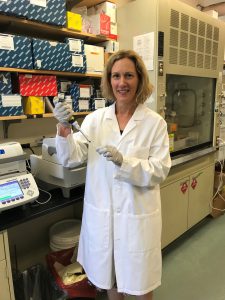From the Laboratory to the Clinic: AACR Grantee Focuses on Pediatric Leukemia
Acute lymphoblastic leukemia (ALL) is an aggressive cancer of the bone marrow and the blood that develops in either B lymphocytes or T lymphocytes. While ALL can occur in both children and adults, it is the most commonly diagnosed childhood cancer, representing around 25 percent of pediatric cancer cases.
Treatment outcomes for children diagnosed with different forms of ALL can vary tremendously. For example, while a cure can be achieved in more than 80 percent of children suffering from B cell acute lymphoblastic leukemias (B-ALL), T-cell acute lymphoblastic leukemias (T-ALL) frequently develop resistance to treatment, resulting in disease relapse with very few options for salvage therapy.
Birgit Knoechel, MD, PhD, a pediatric oncologist at Dana-Farber Cancer Institute and an assistant professor of pediatrics at Harvard Medical School, is all too familiar with the difficulties of treating T-ALL. “As a first-year clinical fellow at Boston Children’s Hospital,” she recalls, “I took care of two teenage boys with the disease, both of whom relapsed very quickly after starting treatment. This experience made me realize the urgent need to identify novel treatment strategies for these high-risk patients and novel biomarkers that predict who will benefit most from these new therapeutic approaches.”
Knoechel explains that T-ALL often harbors activating mutations in the NOTCH1 gene, which confer sensitivity to Notch-inhibiting drugs. Unfortunately, T-ALL rapidly develops resistance to these inhibitors, ultimately limiting their clinical success. Knoechel’s research has so far shown that alongside drug-sensitive cells exist drug-tolerant “persister” cells, from which additional drug-resistant cells continually arise.
While the exact epigenetic and transcriptional state of the pre-existing persister cells currently remains unknown, Knoechel aims to change that. Her research program, funded in part by grants provided through the AACR, employs novel single cell sequencing technologies to characterize the pre-existing transcriptional and epigenetic heterogeneity in T-ALL and to investigate its role in treatment response.
“Detailed mechanistic analyses of epigenetic intratumoral heterogeneity have long been hindered by a lack of effective technologies,” Knoechel explains. “With the use of these novel sequencing approaches, it is now possible to examine transcriptional and epigenetic heterogeneity on a single cell level and define their disease relevance.” According to Knoechel, such knowledge will be crucial in identifying and implementing new biomarkers to predict and monitor resistance and in tailoring therapy to overcome these challenges.
In discussing her work, Knoechel emphasizes the importance of her AACR grants to the success and progress of her research program. In 2016, she was awarded the AACR-Aflac Inc. Career Development Award for Pediatric Cancer Research to study the mechanisms of enhancer rewiring in drug resistant T-ALL. “This grant provided critical funding when I started building my own independent research program and has allowed us to focus on understanding epigenetic rewiring in drug resistance,” she recalls.
This work also fueled Knoechel’s success in acquiring the inaugural AACR-The Mark Foundation NextGen Grant for Transformative Cancer Research in 2018. “The data generated through the AACR-Aflac Inc. grant were absolutely essential for our NextGen grant proposal,” Knoechel says. “This new grant will provide crucial funds toward our study of intratumor epigenetic heterogeneity as the basis for diverse treatment outcomes for difficult to treat cancers in children.”
Knoechel hopes that insights from her research into the epigenetic mechanisms of Notch resistance will result in the identification of new therapeutic targets and the development of novel combination therapies to improve outcomes for patients with treatment-resistant T-ALL and other cancers involving NOTCH1 mutations. “One of the most important things I learned from my mentors,” she recalls, “is to always tailor my research and the questions we ask in the lab to the impact they will ultimately have on the children I provide clinical care for.”
With funding from the AACR, Aflac, and The Mark Foundation for Cancer Research, Knoechel will certainly continue to make an impact on the field of pediatric hematologic malignancies. “I am so grateful for this support,” she says, “as it has allowed me to ask transformative scientific questions and has been instrumental toward establishing myself as an innovative translational scientist.”




